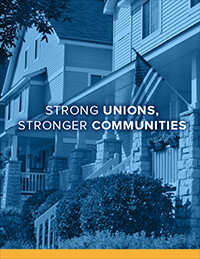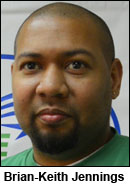STATE GOVERNMENT
Amid attacks, public workers stand together
Report illustrates how strong unions fight to preserve vital community services
 WASHINGTON, D.C. (Nov. 6, 2017) — Last week, the American Federation of State, County and Municipal Employees (AFSCME), the American Federation of Teachers (AFT), the National Education Association (NEA), and the Service Employees International Union (SEIU) released a new report, Strong Unions, Stronger Communities, that looks at numerous case studies where members of labor unions have used their freedom to join strong unions and collective voice to fight for improvements that benefit all working families in communities throughout America.
WASHINGTON, D.C. (Nov. 6, 2017) — Last week, the American Federation of State, County and Municipal Employees (AFSCME), the American Federation of Teachers (AFT), the National Education Association (NEA), and the Service Employees International Union (SEIU) released a new report, Strong Unions, Stronger Communities, that looks at numerous case studies where members of labor unions have used their freedom to join strong unions and collective voice to fight for improvements that benefit all working families in communities throughout America.
The report illustrates how strong unions are making important and often invaluable contributions to our communities every day, whether it is training young people to pursue careers in nursing, or negotiating with employers for better equipment and staffing levels to reduce emergency response times.
“My work as a Child Protection Investigator for the Illinois Department of Children and Family Services is vital to the safety of our state’s most vulnerable children and families,” said Stephen Mittons of AFSCME Council 31 in Illinois. “Together, as a strong union, my colleagues and I are free to speak up to ensure that we can safely and adequately manage our caseloads, which reflects our commitment to safety and public service to our communities.”
“What makes these contributions possible is the freedom of public service workers to come together and pool their resources so they have the strength in numbers they need to speak up for their families, their co-workers and their communities,” the report reads. “But that freedom is under attack at the Supreme Court in a case called Janus v. AFSCME that aims to diminish the ability of working people to stand in strong unions to advocate for the things our communities need.”
In that context, the unions hope to publicize the critical work that public employee unions do to make communities stronger. It’s work that we may never see, but it’s work we couldn’t live without.
The Washington Federation of State Employees/AFSCME Council 28 released a local version of the report that features 10 profiles of rank-and-file union members making a difference every day with their public service. The profiles include:
 Brian-Keith Jennings, who is an adult training specialist at Lakeland Village in Medical Lake, outside of Spokane. State employees at that “campus of caring” train, educate and provide health care for about 210 individuals with intellectual disabilities. For Brian-Keith, it’s personal.
Brian-Keith Jennings, who is an adult training specialist at Lakeland Village in Medical Lake, outside of Spokane. State employees at that “campus of caring” train, educate and provide health care for about 210 individuals with intellectual disabilities. For Brian-Keith, it’s personal.
“I have a son with autism and I treat everybody the same way I would want him to be treated,” he said
 Monique Romans is a social worker in the Home and Community Services branch of the state Department of Social and Health Services in Everett. Despite a caseload of 94, she goes to work every day devoted to the elderly and disabled folks she watches out for in Adult Family Homes, assisted living facilities — even a secure dementia unit in Mill Creek.
Monique Romans is a social worker in the Home and Community Services branch of the state Department of Social and Health Services in Everett. Despite a caseload of 94, she goes to work every day devoted to the elderly and disabled folks she watches out for in Adult Family Homes, assisted living facilities — even a secure dementia unit in Mill Creek.
“I have a master’s degree in social work so I can go a lot of places but I want to be right here,” Romans said. “I let them know that they are heard and I let them know I’m trying to keep them safe. That fulfills me.”
WFSE members recognize that the important work they do to make their communities stronger require a strong union that fights not just for livable wages and benefits for public employees, but also for manageable caseloads and to protect our communities that rely on these critical services.
The national report offers similar stories from across the United States.
“My union just went through a lengthy contract fight in Philadelphia. We had to fight hard to protect our students’ basic needs, such as having at least one nurse and counselor in each school and ensuring that kids had necessary textbooks and materials. And we had to fight back against the district’s desire to eliminate class sizes and get lead testing for the school’s water fountains,” said AFT Local 3 member Jeff Price, a teacher at Central High School in Philadelphia. “Most people assume that the union only fights for teachers’ rights, when in reality, most of our contract is there to protect the basic rights and needs of our students.”
Check out WFSE’s local report and the full national Strong Unions, Stronger Communities report for more information.





